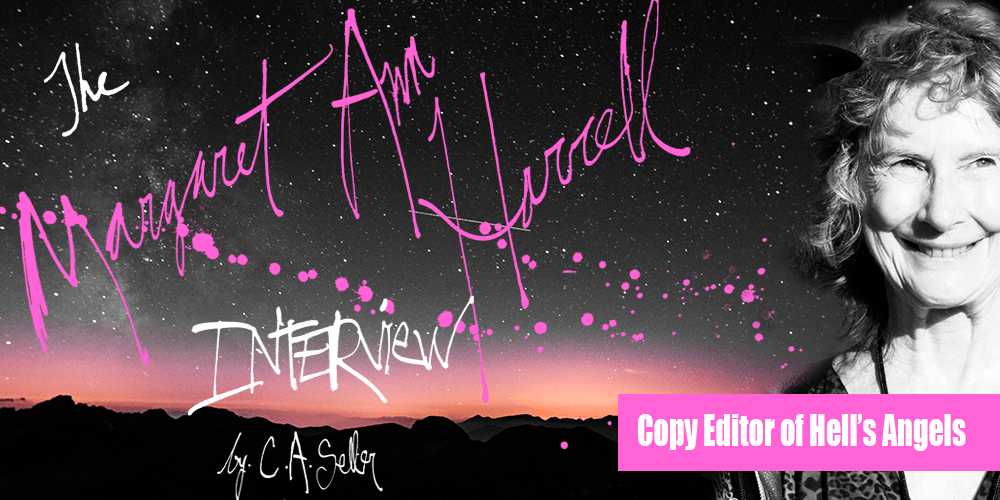Gonzo Today contributor C. A. Seller interviewed me at length, over multiple emails, and then got down to the actual questions, which are included in the final piece. Hats off to him for such work. And there’s a fantastic bit of artwork by publisher Clayton Luce that you have to see, whether you read a word. So here’s the link:
The prepping was a series of emails in which Charlie probed as to what kind of person I was and answered back about himself in kind. That was in addition to actually ordering and reading Keep This Quiet! IV – taking notes, he told me. And that led him to formulate wide-roaming questions. Thanks very much to both Charlie and Clayton. The opening excerpt of the article is below:
C.A. Seller: Primarily, I wish to focus on your latest work, Keep This Quiet! IV: More Initiations. Forgive my lack of vernacular, this is no novel but a historical record of a synchronistic journey. Would that be close or am I off the mark?
Margaret Ann Harrell: Interesting. It was said of the physicist Wolfgang Pauli, oddly enough—that he was a walking synchronicity all his life. And it led him to the Nobel Prize. I like to think of a synchronistic life as one where you go where your energy is. Jung called it “being led by the unconscious” (the personal and collective). For a long time I put all of my intuition into my writing (I thought I was a novelist), and one day I realized that that intuition I was putting into my novel writing, I could as well put into my life. It required believing my intuition knew things my conscious self didn’t—which events proved to me. And as unexpected things happened, the more I was “led by the unconscious,” everything I believed about what was possible in life began to change. So, yes, as I eventually listened to myself, the more I began to find myself in synchronicities.
Carl Jung once said about Pauli, in relation to his dreams, that he must excavate his own microcosm. I tend to think of everyone, on some level, in that way. Everyone has a story and everyone’s story will bring them their very own synchronicities if followed. This is one reason I benefitted so much by knowing Hunter. He wasn’t afraid to listen to himself and act on it, starting when I met him back in 1966. At the time I wasn’t so confident that I could act outwardly as boldly as part of me felt on the inside. The part of me that received all those intuitions as a writer.
Pauli used the term “meaning correspondence,” to emphasize that two parts of a synchronicity might not be synchronous, in time. Here I could give an example that relates to Louisville. When I was very unsure if I would ever get published, I informally asked a woman in Belgium, a budding psychic, about the possibility. She said, yes, I see a book by you in a bookstore window. I took that with a grain of salt till a year later, in the US at a Parapsychology Association Convention in 1995. It was a party, and I again informally asked a woman if I would be published. She told me she had done psychic work for the police in—New York, I believe it was. And she answered the exact same way: I see your book in a bookstore window. Now for the next nineteen years I pondered if this would ever happen. And then I came to Louisville, and there they were, Keep This Quiet! and Keep THIS Quiet Too!, in Carmichael’s window. I marveled that this happened at a Hunter Thompson event, associated with his energy and with Gonzo. The prediction might have been psychic, but the fact that there was energy to bring two events together meaningfully—the prediction and the actual blossoming of it—was a synchronicity. So if we all “excavate [our] own microcosm,” I found that that focus and passion brought to bear leads us to these sorts of synchronicities—all our own. The Pauli and Jung encounter, I go into in Keep This Quiet! III.
CAS: You write that your relationship with Hunter was a spiritual breakthrough. Without giving away IV, can you tell our readers just a little bit?
MAH: Thanks for asking that question, which is very perceptive. I have touched on it above. But to give a little detail. Hunter was unafraid—fearless, uncalculating, if you will—if he really believed something. Or took it into his head to make it important. I don’t mean to imply that he couldn’t be calculating as well, which he could. As I hinted at above, especially as a young woman, I could be fearless and very sure about something if writing about it—if being a novelist, which I was at the time I met him. But it was entirely different feeling than what I displayed on the outside. Hunter saw right through that. He worked with the confident me, the one who understood his book and also stood up for him at Random House if need be and conveyed his messages upstairs and to anyone at all, including Sonny Barger once. There was no question that I had the backbone to do that without flinching, while also without antagonizing those at work (in contrast, I add humorously, to his style). But I didn’t have the gumption or the ability to step outside my ego and stand up for myself personally, publicly at the time I met him. I needed more male models to integrate. And he was perfect for that, beyond the personal attraction. Also, of course, by jumping into a scene, he made it come to life.
